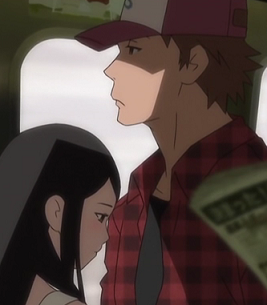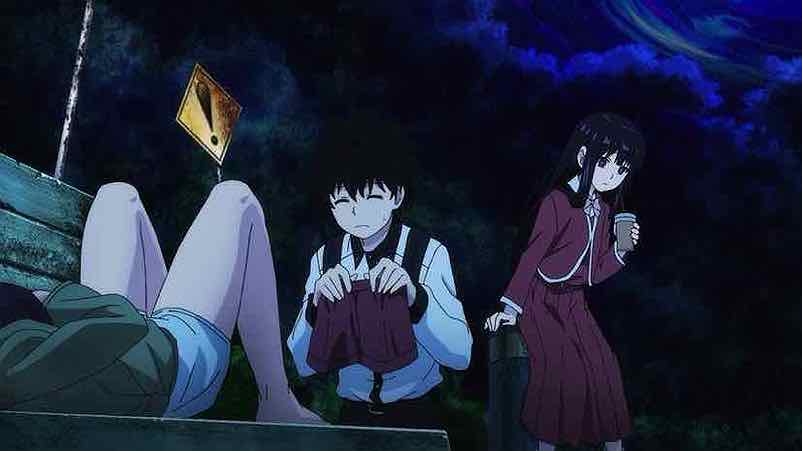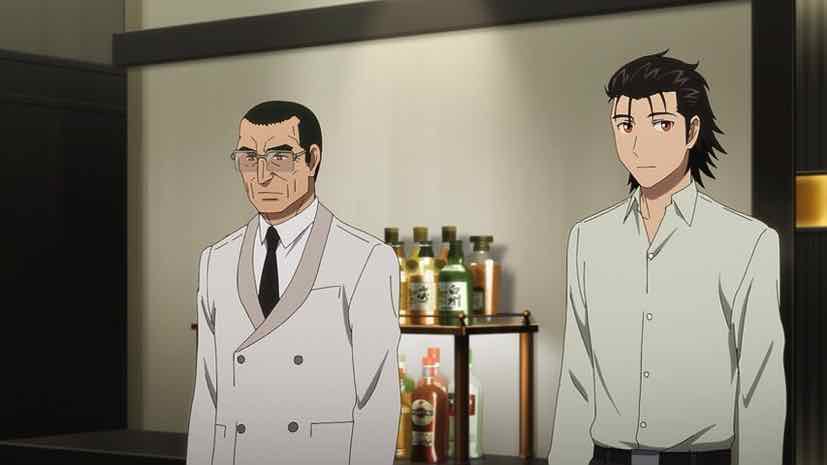A few weeks ago I posted on Animesuki looking for some suggestions for older series I might have missed – and this one came up a few times. It caught my eye and piqued my interest, so I gave it a watch. Thanks to those who recommended it – my review is below. Please note that it’s full of series spoilers, so don’t read it if you haven’t watched the series and think you might.
A very interesting watch. What will strike someone at first, of course, is the unusual visual style. I happen to love Beck and I think Osamu Kobayashi is a real talent, but in the end the combination of still photography and hyper-crude cel animation ended up being more unique than successful – though there were certainly beautiful moments.
For about 7 episodes it was about as slow as I think it’s possible for a series to be – I think my comment to Totoum was that it “makes Sketch Book look like Gurren Lagann” (and no, I wasn’t aware that TTGL reference in episode 12 was coming). A lot of blood has been spilled on trying to define “Slice-of-life” but if any show ever was…
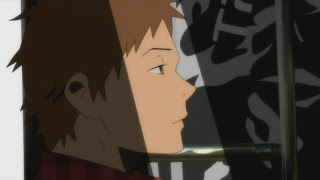 Then, of course, the shit hit the fan and that all changed. I was a bit broadsided because it seemed so out of character for the series, but in the final analysis I think it was a good thing – it gave the series a much-needed narrative jolt and sense of purpose, and cast those early episodes in a different light. Of course everything at that point felt very rushed – starting with Sora’s relationship with Gouta taking about ten steps forward overnight. That, for me, is a flaw. But what the show lacked in narrative sophistication it made up for in sincerity. I especially liked Sora’s line in episode 11 (my favorite episode): “It’s OK if you get married and have lots of kids – but remember me once in a while.” It summed up the moment in a beautiful way.
Then, of course, the shit hit the fan and that all changed. I was a bit broadsided because it seemed so out of character for the series, but in the final analysis I think it was a good thing – it gave the series a much-needed narrative jolt and sense of purpose, and cast those early episodes in a different light. Of course everything at that point felt very rushed – starting with Sora’s relationship with Gouta taking about ten steps forward overnight. That, for me, is a flaw. But what the show lacked in narrative sophistication it made up for in sincerity. I especially liked Sora’s line in episode 11 (my favorite episode): “It’s OK if you get married and have lots of kids – but remember me once in a while.” It summed up the moment in a beautiful way.
As for the ending, which many apparently hated, I thought it was pretty decent. I figured going in there was no way they were going to tie things up without a time skip, and I’m glad they didn’t sell out for some phony miracle where Sora was saved by magic, or heel-clicking or something. The show made its bed and was content to lie in it, letting things play out as they naturally might. I was glad there was a minimum of crying and histrionics – it was understated but still heartfelt, much as the show itself was all along.
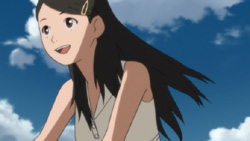 So in the end, for me, an interesting and very good series. I never totally bought into it to the point where my emotions were gutted by what happened – I don’t know exactly why. Perhaps the visuals were too odd and remote, perhaps things were just a bit too meandering early on, and there was just the hint of emotional manipulation in the way the material was presented. That said, I was still genuinely interested to see where things were going, and genuinely cared about the characters – just not with my entire being as I might with a show like Moribito or AnoHana. I’d recommend it to anyone with the patience for a show with a ton of patience, and an eye for something different and unusual. I’ve never seen another anime I’d say it was quite similar to, and that’s a pretty rare statement for me at the close of a viewing.
So in the end, for me, an interesting and very good series. I never totally bought into it to the point where my emotions were gutted by what happened – I don’t know exactly why. Perhaps the visuals were too odd and remote, perhaps things were just a bit too meandering early on, and there was just the hint of emotional manipulation in the way the material was presented. That said, I was still genuinely interested to see where things were going, and genuinely cared about the characters – just not with my entire being as I might with a show like Moribito or AnoHana. I’d recommend it to anyone with the patience for a show with a ton of patience, and an eye for something different and unusual. I’ve never seen another anime I’d say it was quite similar to, and that’s a pretty rare statement for me at the close of a viewing.
A couple of final thoughts. First, the music – quite nice, especially the OP. I enjoyed the folk songs, though I thought they were a bit overused. And the show was quite the travelogue, too – I never made it to Hokkaido, but this really makes me want to even more (and I love tomatoes). I’m especially sorry I didn’t see this before my most recent trip to Tokyo, because I would really have loved to visit Shimokitazawa – which I didn’t know existed before this series. Oh, well – next time…


